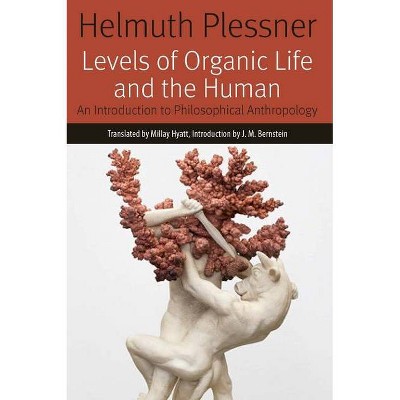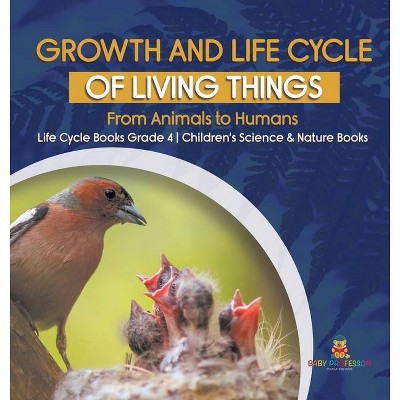Levels of Organic Life and the Human - (Forms of Living) by Helmuth Plessner (Hardcover)

Similar Products
Products of same category from the store
AllProduct info
<p/><br></br><p><b> About the Book </b></p></br></br>A modern classic, this powerful and sophisticated account of embodiment was first published in German in 1928 and now appears in English for the first time. With reference simultaneously to science, social theory, and philosophy, Plessner shows how life can be seen on its own terms to establish its own boundaries. Plessner's account of how the human establishes itself in relation to the nonhuman will invigorate a range of current conversations around the animal, posthumanism, the material turn, and the biology and sociology of cognition.<p/><br></br><p><b> Book Synopsis </b></p></br></br><p>The most important work by a key figure in German thought, Helmuth Plessner's <i>Levels of Organic Life and the Human</i>, originally published in 1928, appears here for the first time in English, accompanied by a substantial Introduction by J. M. Bernstein, after having served for decades as an influence on thinkers as diverse as Merleau-Ponty, Peter Berger, Habermas, and the new naturalists. <p/>The <i>Levels</i>, as it has long been known, draws on phenomenological, biological, and social scientific sources as part of a systematic account of nature, life, and human existence. The book considers non-living nature, plants, non-human animals, and human beings in turn as a sequence of increasingly complex modes of boundary dynamics--simply put, interactions between a thing's insides and surrounding world. On Plessner's unique account, living things are classed and analyzed by their "positionality," or orientation to and within an environment. "Life" is thereby phenomenologically defined, and its universal yet internally variable features such as metabolism, reproduction, and death are explained. <p/>The approach provides a foundation not only for philosophical biology but philosophical anthropology as well. According to Plessner's radical view, the human form of life is excentric--that is, the relation between body and environment is something to which humans themselves are positioned and can take a position. This "excentric positionality" enables human beings to take a stand outside the boundaries of their own body, a possibility with significant implications for knowledge, culture, religion, and technology. <p/>Plessner studied zoology and philosophy with Hans Driesch in the 1910s before embarking on a highly productive philosophical career. His work was initially obscured by the superficially similar views of Max Scheler and Martin Heidegger and by his forced exile during World War II. Only in recent decades, as scholarship has moved more squarely into engagement with issues like animality, embodiment, human dignity, social theory, the philosophy of technology, and the philosophy of nature, has the originality and depth of Plessner's vision been appreciated. <p/>A powerful and sophisticated account of embodiment, the <i>Levels</i> shows, with reference both to science and to philosophy, how life can be seen on its own terms to establish its own boundaries, and how, from the standpoint of life, the human establishes itself in relation to the nonhuman. As such, the book is not merely a historical monument but a source for invigorating a range of vital current conversations around the animal, posthumanism, the material turn, and the biology and sociology of cognition. <p/>This modern philosophical classic, long-awaited in English translation, is a key book both historically and for today's interest in understanding philosophy and social theory together with science, without reducing the former to the latter.</p><p/><br></br><p><b> Review Quotes </b></p></br></br><br>Among twentieth century philosophers Helmuth Plessner stands apart. No one else gives us a philosophical biology bridged to a philosophical anthropology. Living beings are 'boundary-realizing bodies' that sustain their boundary by taking a 'position' toward their environment. Human positionality is 'excentric'--it takes a position on its own positionality--and 'naturally artificial'--always mediated by tools. Plessner anticipates but often goes further than Hans Jonas, Maurice Merleau-Ponty, and Gilbert Simondon. He anticipates key ideas in theoretical biology and cognitive science. His early and unfairly neglected major work is now available in this fine translation. What a welcome moment for twenty-first century philosophy.<b>---Evan Thompson, author of Mind in Life and Waking, Dreaming, Being, <i></i></b><br><br>Helmuth Plessner helped found a school of philosophical inquiry that, unbeknownst to English-language readers, loomed large in the middle decades of the twentieth century. Outfitted with J. M. Bernstein's orienting Introduction, this book matters not merely for historical reasons, but also because some contemporary thought is returning to its premises.<b>---Samuel Moyn, Yale University, <i></i></b><br><br>Plessner's new philosophical paradigm aims to challenge both reductive materialism and the panicky metaphysics of anti-naturalism in all its forms, . . . project[ing] the necessity and unavoidability of pluralism among the natural and human sciences. . . . We are, Plessner argues, <i>naturally artificial</i> beings, beings who can biologically live only through leading a culturally saturated, norm-governed life. The <i>Levels</i> is Plessner's masterwork, and it is patently the premier work of European philosophical anthropology; more importantly, its new paradigm should be regarded as belonging to the forward edge of contemporary philosophical thought.<b>---J. M. Bernstein, from the Introduction, <i></i></b><br><br>This twentieth-century work was a pioneering effort to articulate an alternative to the mechanistic-reductive accounts of life, and especially human life, that have dominated the mainstream of modern scientific culture. Neglected for too long, it is now available to a wider audience in a new climate, where it will have its full impact.<b>---Charles Taylor, author of A Secular Age, <i></i></b><br><p/><br></br><p><b> About the Author </b></p></br></br><b>Helmuth Plessner (Author) </b><br> <b>Helmuth Plessner</b> (1892-1985) was a German philosopher and sociologist. From 1953-59, he was president of the German Sociological Association. Three of his many books have appeared in English, <i>Political Anthropology</i> (Northwestern, 2018), <i>The Limits of Community</i> (Humanity Books, 1999) and <i>Laughing and Crying</i> (Northwestern, 1970). <p/><b>J. M. Bernstein (Introducer) </b><br> J. M. Bernstein is University Distinguished Professor in Philosophy at The New School for Social Research in New York City. <p/><b>Millay Hyatt (Translator) </b><br> Millay Hyatt is a writer and translator based in Berlin. Her dissertation, "No-Where and Now-Here: Utopia and Politics from Hegel to Deleuze," received the University of Southern California's doctoral research prize. <p/>
Price History
Price Archive shows prices from various stores, lets you see history and find the cheapest. There is no actual sale on the website. For all support, inquiry and suggestion messagescommunication@pricearchive.us



















